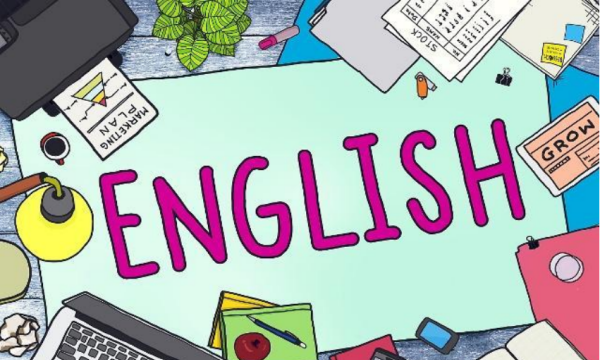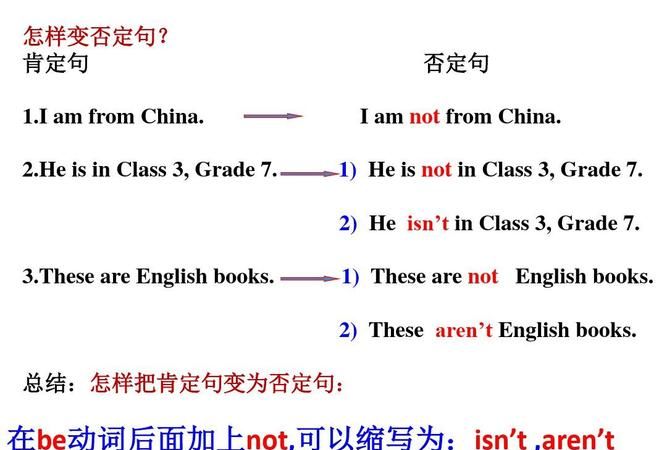本文目录
肯定句变否定句的例子
肯定句变否定句20个例子英语如下:
1、I think she is there.
否:I don't think she is there.
2、He can sing this song and that one.
否:He cannot sing this song or that one.
3、Tom went to school too.
否:Tom didn't go to school either.

4、He has had supper already.
否:He hasn't had supper yet.
5、He had a good rest just now.
否:He didn't have a good rest just now.
6、Let's do it.
否:Don't let's do it.或Let's not do it.
7、He always gets there on time.
否:He never gets there on time.

肯定句变否定句方法:
1、be动词的否定式。
be 动词根据不同的人称和时态有不同的形式,在一般现在时中是am , is , are可用作联系动词,构成否定式时,一律在其后面加否定词not.
He is reading.——He is not reading. They are from China. ——They are not from China.
2、情态动词的否定式。
情态动词的否定式是在其后面直接加not. 如:
I can swim. ——I can't swim. He can dance. —— He can't dance. You should go to school at seven. ——You shouldn't go to school at seven.
3、实义动词的否定句。
实义动词变否定句时,要借助助动词do , does,在一般现在时中用do或者does其句子结构为:主语+ don't / doesn't+动词原形+其它 。
肯定句变否定句的例子
肯定句变否定句20个例子英语:
1、肯定句:She is going to China next month.
否定句:She isn't going to China next month.
2、肯定句:There were some ducks and chickens on the farm too.
否定句:There weren't any ducks or chickens on the farm either.
3、肯定句:I am a teacher.
否定句:I am not a teacher.
4、肯定句:I can play the pianno well.
否定句:I cannot play the pianno well.
5、肯定句:His family will fly to Beijing.
否定句:His family won't fly to Beijing.
6、肯定句:The little boy should go to bed early.
否定句:The little boy shouldn't go to bed early.
7、肯定句:The students often sing songs after school.
否定句:The students don't often sing songs after school.
8、肯定句:The boys runs fast.
否定句:The boys doesn't run fast.
9、肯定句:The king showed his new clothes to us.
否定句:The king didn't show his new clothes to us.

10、肯定句:l am a student.
否定句:l am not a student.
11、肯定句:He is here.
否定句:He isn't here.
12、肯定句:They are going to go fishing this week.
否定句:They are not going to go fishing this week.
13、肯定句:They are working hard.
否定句:They are not working hard.
14、肯定句:She was a teacher.
否定句:She wasn't a teacher.
15、肯定句:They were very happy.
否定句:They weren't very happy.
16、肯定句:We can dance very well.
否定句:We can not dance very well.
17、肯定句:Tom has something to tell his teacher.
否定句:Tom doesn't have something to tell his teacher.
18、肯定句:My mother does some washing every morning.
否定句:My mother doesn't do some washing every morning.
19、肯定句:Alice likes singing and dancing.
否定句:Alice doesn't like singing and dancing.
20、肯定句:We visited the old man yesterday.
否定句:We didn't visite the old man yesterday.
英语否定句的句子有哪些
英语语法中否定句分为九种:
(1)一般否定句
I don't know this.否定句式
No news is good news. 否定词no
There is no person smoking here.

(2)特指否定
He went to his office, not to see him.
I am sorry for not coming on time.
I don't think/believe/suppose/feel/imagine you are right.
(3)部分否定
All the answers are not right
All is not gold that glitters.
I don't know all of them.
I can't see everybody/everything.
Both of them are not right.
(4)全体否定
None of my friends smoke.
I can see nothing/nobody.
Neither of them is right.
Nothing can be so simple as this.
(5) 延续否定
You didn't see him, neither/nor did I.
You don't know, I don't know either.
He doesn't know English, let alone/to say nothing of/not to speak of (更不用说) French.
(6) 半否定句
We seldom/hardly/scarcely/barely hear such fine singing.
I know little English. I saw few people.
(7) 双重否定
You can't make something out of nothing.
What's done cannot be undone.
There is no sweet without sweat.
No gain without pains.
I can't help /keep/ laughing whenever I hear it.
No man is so old but (that) he can learn.
(8)排除否定
Everyone is ready except you.
He did nothing but play.
But for your help, I couldn't do it.
(9)加强否定
I won't do it at all.
I can't see it any more.
He is no longer a boy.
否定句的例子
一般否定句:I don't know this. No news is good news.特指否定:He went to his office, not to see him. I am sorry for not coming on time.部分否定 :否定词加表示全体的词:I don't know all of them.
否定句例子
(1)一般否定句
I don't know this. No news is good news.
There is no person(smoking)/not a person/not any person(smoking)in the house.
(2)特指否定
He went to his office, not to see him.
I am sorry for not coming on time.
I don't think / believe/suppose / feel / imagine you are right.
(3)部分否定
All the answers are not right
All is not gold that glitters
I don't know all of them.
I can't see everybody/everything.
Both of them are not right.
否定句改变方法
表示某一否定意思。句中一定有not。
有三种可能:be动词(am、is、are、was、were)+not、情态动词(can、must、should)+not、助动词(do、does、did)+not
1.看句中有无be动词,如有,直接在be动词后+not。
2.看句中有无情态动词,如有,直接在情态动词后+not
3.如上述二者都没有,就应用助动词+not
分四个步骤:
(1)肯定陈述句中本来是没有助动词的,要加上去,位置在主语(某人或某物)后,动词前。
(2)确定助动词用do、does还是did,根据句中动词,动词是原形的助动词就用do,动词是第三人称单数的助动词就用does,动词用过去式的助动词就有did。
(3)在助动词后加not。
(4)原句中动词假如发生变化就要恢复成原形。

以上就是关于英语否定句50个例子,肯定句变否定句的例子的全部内容,以及英语否定句50个例子 的相关内容,希望能够帮到您。
